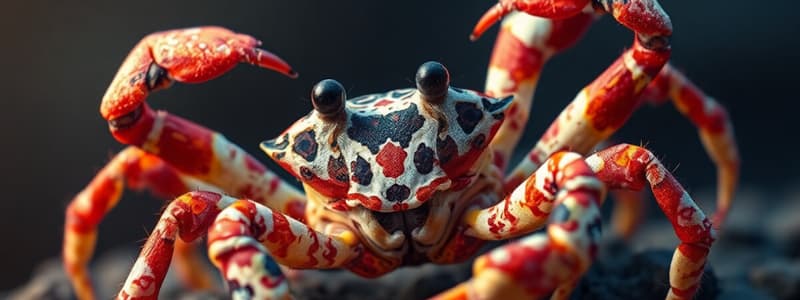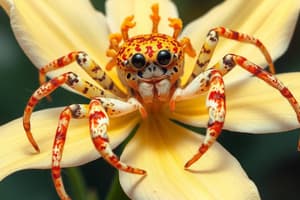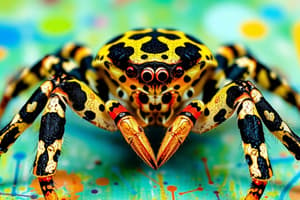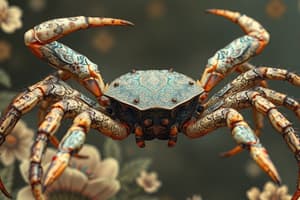Podcast
Questions and Answers
What is the main purpose of the male and female crab spiders camouflaging themselves as a flower?
What is the main purpose of the male and female crab spiders camouflaging themselves as a flower?
- To increase their chances of catching prey (correct)
- To communicate with each other
- To attract other species for mating
- To make it easier to defend their territory
What distinguishes the male crab spider from the female crab spider in terms of appearance?
What distinguishes the male crab spider from the female crab spider in terms of appearance?
- The male is smaller and darker (correct)
- The male is usually larger and brighter
- The female has a more aggressive coloration
- The female is always camouflaged while the male is not
What was unique about the camouflage behavior of the male crab spider observed by Wu and Gao?
What was unique about the camouflage behavior of the male crab spider observed by Wu and Gao?
- It was the first evidence of a male spider engaging in mimicry (correct)
- This behavior is common in all spider species
- Male spiders are typically better at camouflage than females
- Male spiders only camouflage during mating season
How do researchers believe cooperation in mimicry systems affects the spiders?
How do researchers believe cooperation in mimicry systems affects the spiders?
What was a notable observation made by Shi-Mao Wu upon first seeing the male spider?
What was a notable observation made by Shi-Mao Wu upon first seeing the male spider?
Flashcards
Cooperation mimicry
Cooperation mimicry
A type of camouflage where two individuals of the same species cooperate to create a more convincing disguise.
Crab spider
Crab spider
A spider that uses camouflage to blend in with its environment, especially flowers.
Pistils and stamens
Pistils and stamens
The central reproductive parts of a flower, often resembling a male spider in this case.
Camouflage
Camouflage
Signup and view all the flashcards
Mimicry
Mimicry
Signup and view all the flashcards
Study Notes
Crab Spider Camouflage in China's Yuan Province Rainforest
- Scientists Shi-Mao Wu and Jiang-Yun Gao observed a male and female crab spider mimicking a single flower in a Chinese rainforest.
- The male spider mimicked the flower's stamen and pistils, and the female mimicked the lighter petals.
- The spiders' successful mimicry deceived the researchers initially, with the male spider's observation preceding the female's.
- This behavior is a common camouflage tactic for female crab spiders, who often change color to match their surroundings, aiding in protection from predators and prey capture.
- However, this cooperative mimicry behavior, where both spiders work collaboratively to blend in, is rarely observed in male crab spiders, which are smaller and darker.
- The observation represents the first evidence of cooperative mimicry in any species.
- The coordinated camouflage likely improves survival and hunting effectiveness for both male and female spiders, expanding their niche.
- Research findings were published on March 1, 2024.
Studying That Suits You
Use AI to generate personalized quizzes and flashcards to suit your learning preferences.





